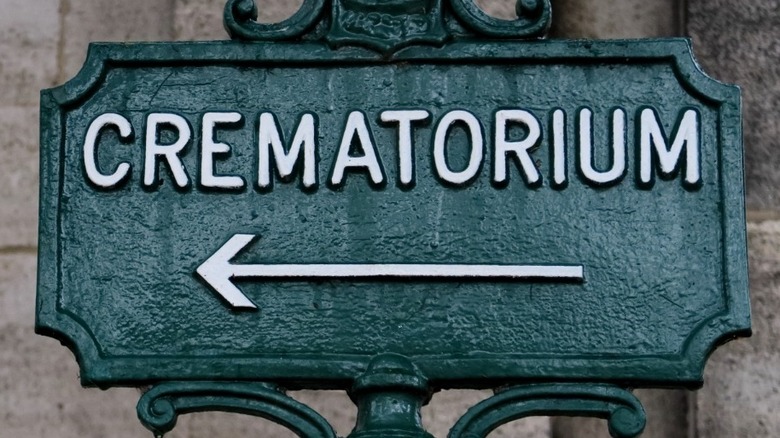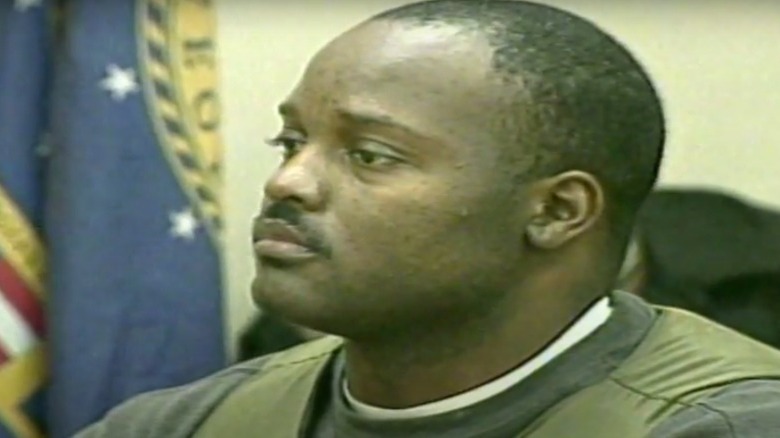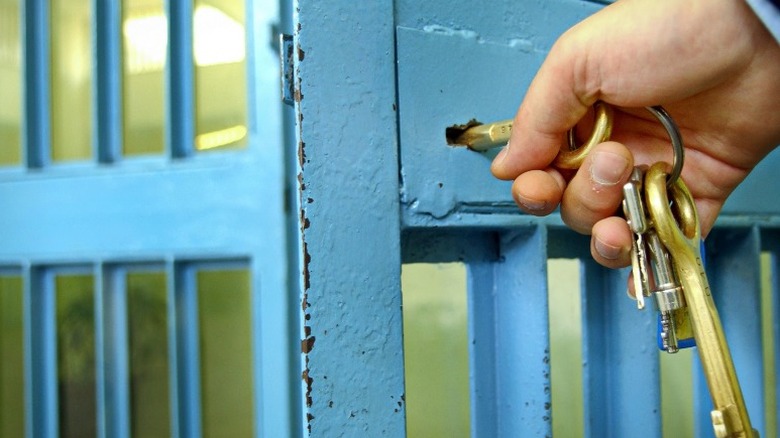The Horrors Discovered In A Georgia Crematorium Still Haunt Us Today
For fans of horror, there might be nothing more cliched than a funeral home or a crematorium as the setting for a chilling novel or a grotesque film. Whether it's the "Phantasm" movie franchise or the 1983 film "Mausoleum," these locations serve as a fitting backdrop for supernatural events and unspeakable horror. Even though scores of books and movies have used these true-to-life locations to help set the mood for the scares that they are selling, it's understood that these are all works of fiction, meant to entertain.
With that in mind, imagine everyone's horror when a well-respected family-owned crematorium made headlines in 2002 after hundreds of bodies in various states of decomposition were discovered on the property. Working on an anonymous tip, investigators visited the business, only to discover what some of them would later describe as a modern-day house of horrors. Twenty years later, the community of Noble, Georgia is still struggling to heal from this crematorium's blatant disregard for the dead, as well as the financial scam that was being pulled on area funeral homes.
A dog helped lead authorities to the horror
The Tri-State Crematory was first opened in the early 1970s by a Nobel, Georgia native named Tommy Marsh. A respected businessman in his community, Marsh owned and operated this establishment for over 20 years, contracting with area funeral homes for their clients' cremation services. Due to some health issues, Marsh had to step back from the business in the mid-1990s, turning it over completely to his son Ray Brent Marsh in 1996 (per Ranker). It was under the younger Marsh's command that several complaints were filed with local authorities.
In 2000, a gas man filed a complaint with the local sheriff's department. He claimed that while he was working there, he saw several dead bodies scattered on the property. A county investigation was initiated but deputies dispatched to the crematorium reported nothing out of the ordinary. In November 2001, someone anonymously reported to the Environmental Protection Agency (EPA) that there were human body parts in the woods near the crematorium. The EPA informed the local sheriff's department about the complaint, who again showed up and investigated but reported nothing to substantiate the anonymous tip (via Channel 9 News).
In early 2002, Marsh's luck ran out. Someone was walking their dog near the property when the dog discovered what was believed to be a human bone. Federal authorities were contacted this time, who dispatched agents to the Tri-State Crematorium the next day. While searching for only a few hours, the agents discovered 49 bodies in various states of decomposition in buildings and on the grounds. But this was only the beginning.
More than 300 bodies were recovered
Suspecting that there would be more bodies to be recovered, authorities requested a federal disaster team be dispatched to the scene. They were correct in their thinking. Wicked Horror writes of how 334 bodies were eventually discovered. Those on the scene of this real-life horror film reported that they found bodies stacked on top of each other, bodies still dressed in their funeral attire or hospital gowns, and bodies that were crammed inside of makeshift coffins. Every state of decomposition was on display, from fresh corpses to skeletons. Many of the recently deceased leaked fluids into pools, their bodies abandoned by Marsh (above). In what might have been the most heartbreaking discovery, one body was discovered laid over a wooden crate, with the skeleton of a young child at its feet.
Out of the nearly 350 corpses found on the property, only 226 were able to be identified. At the beginning of their investigation, federal agents had a make-shift morgue brought in to help them sort and catalog their findings. Even with this sorting system and experts on hand, some of the bodies were too far gone for them to be recognized (via Channel 9 News).
With a crematory on location, it was questioned as to why Marsh would allow these bodies to be stored rather than just incinerated. WSB-TV 2 noted that it would likely have been easier for Marsh to have just done what he was being paid to do, rather than abandon the bodies.
What predicated Marsh's actions?
According to CBS News, Marsh never gave any public explanation as to why he just let the bodies accumulate. At one point early in the investigation, Marsh did state that his incinerator was broken, but offered no reason why he never fixed it (per Channel 9 News). Throughout the investigation, it was revealed that Marsh was giving funeral homes concrete dust instead of human cremains, keeping up the illusion that he was still conducting business as usual at his crematorium. This revelation added some serious additional charges to the already numerous ones on the criminal complaint against him.
The State of Georgia charged Marsh with nearly 800 criminal counts, including abuse of a corpse, burial service-related fraud, theft by deception, and giving false statements. Facing nearly 1,000 years if convicted on all counts, Marsh struck a plea deal with prosecutors. He would plead guilty in 2004 in exchange for a 12-year prison sentence and 75 years probation (per WSB-TV 2).
In 2007, Marsh's attorney purported that Marsh had elevated levels of mercury and other levels of metals in his system, likely from faulty ventilation in the facility resulting in years of mercury fillings being melted and invading the air Marsh breathed. This could have caused "mad hatter syndrome," diminishing Marsh's cognitive abilities. It was noted that the longer Marsh got into his prison sentence, the more lucid and clear-headed he became.
A community tries to heal after Marsh is released
In June 2016, Marsh was released from prison after serving the full 12 years of his term. According to WSB-TV 2, he was met at the prison gates and driven home by the attorney who helped negotiate his plea bargain, McCracken Poston. On probation for the remainder of his life, Marsh must adhere to strict rules or else face some pretty severe financial consequences. Acting as Marsh's attorney, Poston stated that Marsh will probably say very little to the media or anyone else about his crimes, lest he violate a provision of that plea arrangement. The agreement includes a stipulation that Marsh never can profit from his crimes, which would prohibit him from making any book or movie deals. Poston stated, "If he ever says anything that's interpreted, he might make anything from it, it triggers a provision in the sentence where he owes Walker County $8 million, so that might prompt you to be a little quiet, I think."
In regard to his client's release from prison, Poston had this to say: "I think it's time to forgive Ray Brent Marsh. It's time to welcome him back to the community. I just want people to leave him alone and give him a chance."




